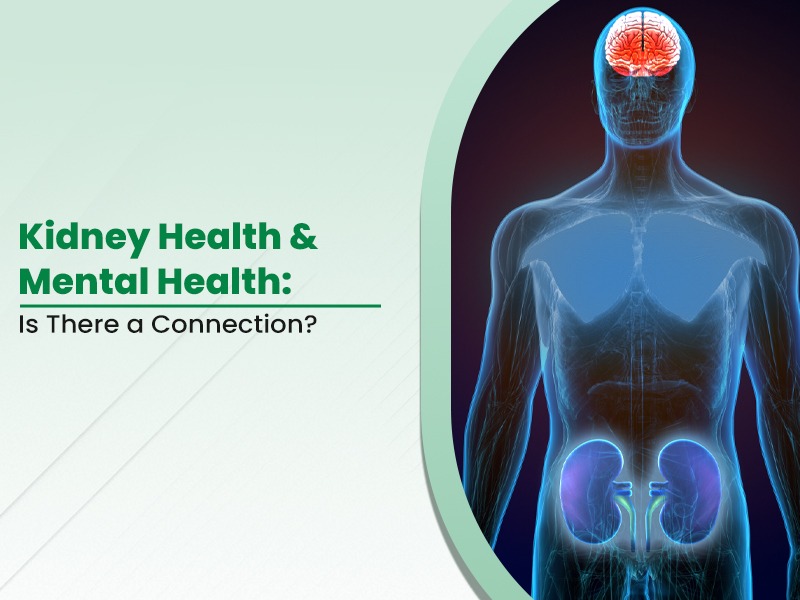
Kidney Health & Mental Health: Is There a Connection?
When we consider kidney health, we think about its physical functions like filtering blood, excreting waste, balancing electrolytes, and controlling blood pressure. However, recent studies have brought to light an important but often forgotten link between kidney health and mental health. For patients with kidney disease (CKD) or other renal conditions, emotional health is just as important as medical health.
The Kidney–Mind Connection
The kidneys are critical organs that have many influences in the body, including hormones. When kidney function is impaired, toxins can build up in the blood, leading not only to physical symptoms of fatigue or illness but also to cognitive difficulties, mood swings, or depression. Patients on dialysis or long-term treatment often feel higher levels of stress and anxiety.
Additionally, mental health conditions such as depression can limit one’s motivation to adhere to diet restrictions or treatment plans, thus further impairing kidney health. This established cycle illustrates how physical and mental health can impact one another and shows how important it is to give care on both levels.
Why Patients Experience Mental Health Strain
Numerous factors contribute to the emotional challenges experienced by populations with chronic kidney disease:
- Lifestyle change: Living with kidney disease often requires strict diets, liquid restrictions, regular hospital visits, etc. This can be overwhelming.
- Physical symptoms: Pain, fatigue, or sleep problems related to kidney disease can lead to increased levels of anxiety.
- Uncertainty: Stress can result from concerns related to prolonged treatment, dialysis, or transplant.
- Social isolation: Withdrawal from social activity can affect an individual’s overall mental health.
Acknowledging these challenges is important, and they should be taken into account in a holistic care plan that provides psychological support in conjunction with medical treatment.
How to Care for Both Kidneys and Mind
- Regular check-ups: Routine blood and urine tests can detect kidney disease in its early stages. Since advanced stages often cause serious complications, timely check-ups are crucial for prevention and early intervention.
- Consulting the right specialists: If you or someone close to you has a kidney issue, the right first step is to consult a kidney specialist in Ghaziabad who has access to advanced diagnostic tests and expertise in treatment options.
- Emergency assistance: In some cases, your condition may deteriorate into a chronic escalation of your renal condition requiring immediate medical assistance for severe symptoms (e.g., new-onset swelling, shortness of breath, little or no urination). In those cases, a search for an emergency hospital near me is prudent.
- Psychosocial support: Counselling, meditation, support groups, and more can facilitate coping and adjustment for renal patients suffering from a chronic illness.
- Healthy lifestyle: A balanced diet, hydration (consult medical advice here), and regular physical exercise will be of benefit for both kidneys and for mental health.
The Role of Hospitals and Specialists
Hospitals today understand that there is such a thing as integrated care, where nephrologists work with psychologists and nutritionists to make sure the patient receives medical treatment, but also addresses other factors that affect them. Most people, however, don’t have that level of medical care in their hometown. That’s where consulting a kidney care specialist in Ghaziabad can provide patients with better medical care, family support, and improved treatment options.
Suppose someone is having an emergency, like acute kidney infections or complications due to dialysis. The first step for patients in an emergency should be to locate the nearest hospital and ensure they receive timely care through the triage system. Sometimes, if someone gets treatment too late, it could cost them their life or long-term complications.
Final Thoughts
Kidney health and mental health are linked in many facets. A healthy body requires a healthy mind, and the opposite is also true. Patients with kidney issues should not forget about their mental health if they have it under control, and vice versa if it impairs their physical health and leads to stress.
Speaking to a reputable kidney doctor in Ghaziabad and knowing an emergency hospital near me during emotional distress is part of an important pathway toward complete care. Good health is not only the absence of disease but also achieving a state of balance between body and mind, and trusted centers like Yashoda Medicity play a vital role in providing such holistic care.
